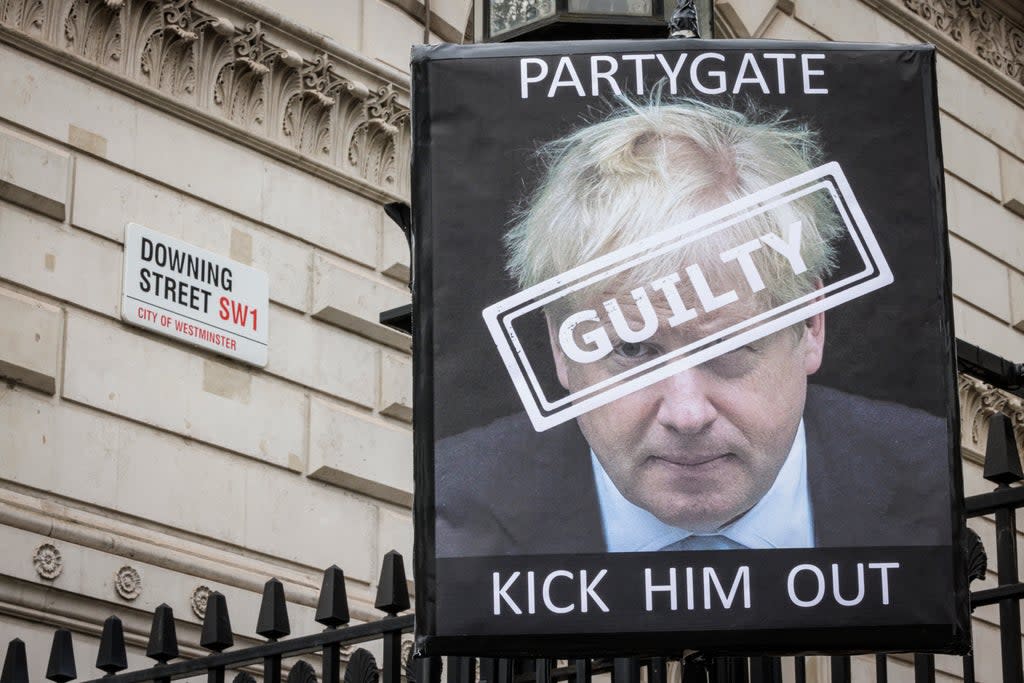Partygate: Boris Johnson accused of ‘showing no respect for law and order’ as he prepares to address parliament

Boris Johnson has been accused of showing “no respect for law and order”, as he prepares to face a grilling from MPs in his first parliamentary appearance since being fined by the Metropolitan Police.
As the Commons returns from its Easter recess, the prime minister, who is also marking 1,000 days in No 10, is expected to again offer a “full apology” for breaking the Covid regulations his government designed.
In a statement at around 3.30pm on Tuesday, Mr Johnson will “have his say” on the scandal that has destabilised his premiership and “outline his version of events” before taking questions, a minister said on Monday.
It comes after Scotland Yard’s explosive decision last week to issue fines to the prime minister, his wife, Carrie, and the chancellor Rishi Sunak, for attending a birthday gathering in the Cabinet Room in June 2020.
On Monday, the former Conservative MP and cabinet minister Rory Stewart urged his former colleagues to act, claiming: “Every day that Boris Johnson remains tarnishes his party and the office of the prime minister.
“Removing him is not the only ethical thing for Conservative MPs to do. It also profoundly in their long-term interest.”
While many Tory MPs have stood by the prime minister – citing the war in Ukraine – Mr Johnson still faces the possibility of further fines and fresh allegations over the weekend he led celebrations for his former No 10 spin doctor, Lee Cain, on 13 November 2020.
A No 10 source denied that Mr Johnson had “instigated” the leaving drinks event for his former director of communications, during England’s second lockdown, after it was reported the prime minister “started pouring drinks” for individuals present and “drinking himself”.
The veteran Tory MP Sir Roger Gale, who called for Mr Johnson to resign earlier this year, but has since said now is not the time to change leader, said on Monday that “if another three or four fines” were to follow, and the anticipated Sue Gray report into the saga was “damning”, then the point could be reached where “all credibility is now gone – he has to go”.
Sir Keir, the Labour leader, who has put tackling crime at the centre of his campaign for the 5 May local elections, also claimed that Mr Johnson has showed “no respect for law and order”.
“How can the country have faith in the system if even when justice is served, it apparently has no consequences?” he asked.
After delivering a Commons statement, Mr Johnson is then expected to separately address Tory MPs on Tuesday evening, in an effort to shore up support among wavering colleagues in the parliamentary party.
He is then due to travel to India on Thursday on a visit Labour insisted would be viewed as a “vanity trip” to distract from his domestic troubles on the Partygate scandal and the cost of living crisis, unless major commitments are secured in New Delhi.
It is understood Westminster’s opposition parties are also considering all options available to sanction the prime minister, including pushing for a vote on a contempt motion in the Commons.
They could also ask to the Speaker, Sir Lindsay Hoyle, to refer the matter to the cross-party Committee of Privileges, which would examine whether contempt has been committed before giving MPs a vote.
At the weekend, Caroline Lucas, the Green Party MP, wrote to Sir Lindsay asking whether he would “facilitate a process whereby” MPs can hold the prime minister and chancellor, Rishi Sunak, who was also fined last week, “to account for misleading parliament”.
Dr Alice Lilly, a senior researcher at the Institute for government think tank, told BBC Radio 4’s Today programme, that while the government has control over most of the order paper – the day to day business of the House of Commons the Speaker has some “discretion”.
“Motions relating to contempt largely fall under that, so the speaker will have a role to play,” she said. “But it is something that potentially puts the Speaker in quite a tricky position this week.”
While the prime minister’s 80-strong Commons majority may be enough to see off a censure motion, it could cause major embarrassment for Tory MPs who will be forced to walk through the division lobbies and cast a vote on Mr Johnson’s conduct.

 Yahoo News
Yahoo News 
